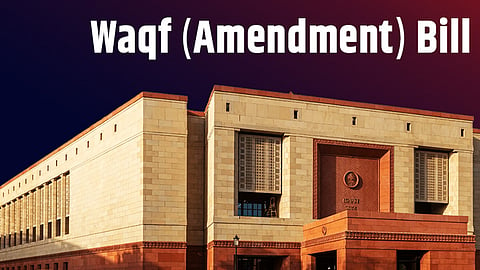
- Home
- Live Blog
- Breaking News
- Top Headlines
- Cities
- NE News
- Sentinel Media
- Sports
- Education
- Jobs

GUWAHATI: The Waqf (Amendment) Bill 2025 continued to be among the most debated issues in Parliament on Wednesday when the Lok Sabha debated a marathon 12-hour debate before clearing the bill early Thursday morning. The bill was passed by a margin of 288 votes for against 232 votes against.
Union Home Minister Amit Shah, during his intervention in the debate, launched a scathing critique of the previous UPA government's 2013 amendments to the Waqf laws. He described the amendments as politically motivated and hastily implemented before the 2014 general elections.
Shah particularly highlighted the transfer of 123 VVIP properties in Delhi’s Lutyens zone to Waqf authorities as one of the most significant consequences of those changes. He contended that if these amendments had not been introduced, then the necessity of the present bill would not have been felt.
The Home Minister emphasized the necessity of making the Waqf Board accountable to avert financial misuse. His observations were seconded by Union Parliamentary Affairs Minister Kiren Rijiju, who strongly defended the government's action against criticism that the bill was aimed at Muslims.
Rijiju contended that it was the past governments that had created divisions by creating different boards for the Sunni and Shia sects, whereas the present government was introducing a single board to ensure unity.
Rijiju also addressed concerns regarding the role of non-Muslims in Waqf matters, explaining that legal frameworks already exist to regulate land usage across communities. He clarified that Waqf properties would now require proper documentation to prevent disputes and ensure transparency.
Amid the heated debate, AIMIM president and Hyderabad MP Asaduddin Owaisi strongly opposed the bill, describing it as an insult to Muslims. Owaisi asked why similar measures were not being followed against Hindu religious institutions, and for this, Rijiju replied that laws already exist to govern Hindu religious properties.
Jagdambika Pal, JPC Chairman on the Waqf (Amendment) Bill, stated that the bill would be highly advantageous for Muslims. He refuted allegations by opposition members that the bill was being brought for political benefits before the Bihar Assembly elections.
Although fears expressed by opposition leaders, Syed Naseruddin Chishty, Chairman of the All India Sufi Sajjadanashin Council, put aside fears that the bill would result in the acquisition of religious properties. He ensured that the bill was just implementing stricter provisions to avoid the misuse of Waqf properties.
Congress MP Gaurav Gogoi, however, vehemently opposed the bill, terming it an attack on Parliament and the Constitution. He accused the government of having a motive behind the legislation to target the Muslim community. Likewise, Samajwadi Party President Akhilesh Yadav criticized the bill, questioning the government's meaning of "Unified Waqf Management" and terming the bill as incomprehensible.
Senior Congress leader Rashid Alvi took it one step further by assuring that the Congress will rework the Waqf law when they come back to power in 2029. Other Congress leaders, such as spokesman Pawan Khera and MP K.C. Venugopal, also condemned the bill as discriminatory, anti-Muslim, and against the ideology of the Indian Constitution.
While National Commission for Minorities (NCM) Chairman Iqbal Singh Lalpura also supported the bill, terming it as being in the greater interest of the community, opposition parties in Jammu and Kashmir, except the BJP, voted against the bill unanimously. J&K National Conference leader Omar Abdullah claimed the bill was an effort to disenfranchise Muslims and unfairly target one religious group.
ALSO READ:
ALSO WATCH: